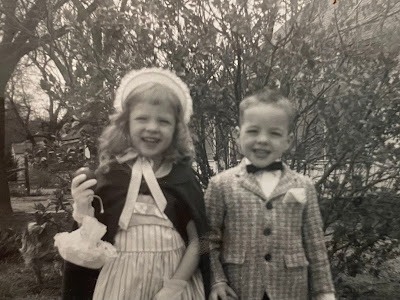Today's Protests:
Washington DC, New York City, Philadelphia
I liked a lot of things about Ann Patchett's novel
Tom Lake --
beautiful imagery and references to
Our Town, calling out some
ridiculous stereotypes, a deep understanding of
the passage of time. But I also disliked a lot of things, most of which concern the superficiality of Lara's character. I could never quite figure out if Patchett is intentionally creating a shallow character, or if Patchett herself is shallow. Is Patchett lying to her readers, or is Lara lying to her daughters?
In a serious family discussion, Lara's daughters express their concern about the dangers of childbirth and the disinclination to bring children into a troubled world.
Lara responds: "Every generation believes the world is going to end."
Her daughter Emily: "Is that true? Did you and Dad think it was all going up in a fiery ball?"
Lara: "No, I said it to make you feel better." We "thought about the plays we wanted to get tickets for, the price of rent, whether or not we should go out to dinner, how soon we could afford to have a baby. We didn't think anything would end, any of it ever." (149).
Really? Why does Patchett choose these flippant lines for her character? Lara, just like Patchett in real life, was born in 1963. My friends and I were a little older (born in 1957), but we certainly were not immune from thinking about the "fiery ball" of nuclear devastation. That's what it meant to grow up during the Cold War. Apocalyptic visions and narratives of annihilation were everywhere -- at the movies, at Sunday School, in fiction and non - fiction; on the news at night waiting for the Vietnam War to end. We were taught that
ZPG was necessary to avoid the population explosion and a predicted scarcity of natural resources. Is Lara supposed to be oblivious to the fact that
Earth Day has been
an environmental protest event for the last 55 years?
Okay, at first she was a little kid, but the threat of nuclear destruction lasted for decades. How about when everyone else in the country was watching
The Day After? That was 1983, when Patchett / Lara was 19 or 20 years old. Has she forgotten all that? Or did she just miss it entirely the first time around and now denies that the anxiety ever existed? Either way, she is very wrong when she says that young adults in the 1980s were not worried about anything beyond restaurants and shows.
In his article, "
Mad Max's implausible post-oil eco-dystopia," journalist and
Slow Boring blogger Matthew Yglesias -- born in
1981 -- corroborates:
" . . . there is no nuclear apocalypse in the original 'Mad Max,' just Australian society teetering on the brink of dissolution due to natural resource scarcity.
"That film was made in 1979, when eco-dystopian thought had incredible cultural currency. . . . It’s not that we don’t still have eco-dystopians. But they are much more likely to worry that oil is too plentiful than that it’s too scarce. [emphasis added]
"What’s fascinating, though, is that in the doomer mindset, the line between 'the world will end because we are running out of oil' and 'the world will end because we are burning too much oil' is paper thin."
One of Yglesias's readers responds:
"Doomers went from 'the world will end because we are running out of oil' to 'the world will end because we are burning too much oil,' just like they flipped from 'We're doomed because people are having too many children' to 'We're doomed because people are having too few children,' or from 'Society is falling apart because permissive parents give their kids too much freedom' to 'Society is falling apart because helicopter parents give their kids too little freedom.' The one constant is the belief that humanity is bad and deserves to be punished; they fill in the details later."
~Wayne Karol
Sure, whether or not the fears are well-founded is debatable. But the fear was real then, and it is real now. Don't tell your childen or your readers otherwise.
In her memoir Loose Change, Sara Davidson recalls being a college student during the Cuban Missile Crisis. Up until then, around the fountain on the mall "at noon, liberal students and religious fanatics would speak to small crowds. In October of 1962, something changed . . . the crowds . . . swelled to thousands. The Russians were sending a fleet of ships loaded with nuclear missiles to Castro . . . Atomic weapons would be pointed at our cities. . . .
Around her kids were talking about buying canned food and building air - raid shelters. She closed her eyes and saw San Francisco in flames beneath a mushroom-shaped cloud. She went to a pay phone and called her mother to say good-bye. . . . The next morning, Susie woke up to find herself alive. The crisis was over; the Russian ships had turned back" (37).
The Second Trumpet
from the Cloisters Apocalypse (1330)
































